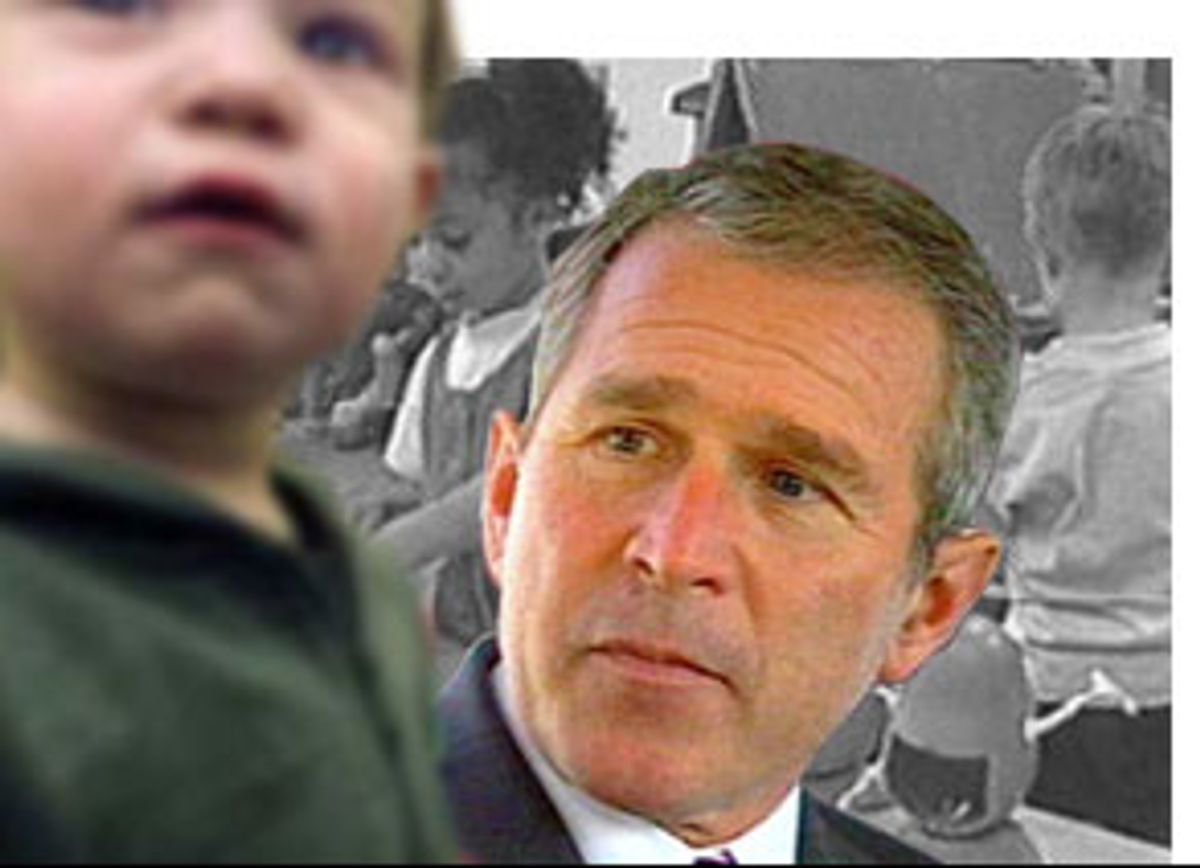I never really thought of compassion as a relative thing. I never thought of it as a twisted form of sympathy in which one's consciousness of others is limited and the desire to alleviate their distress is perversely linked to fleeting and selfish goals. I now imagine that this is what is meant by compassionate conservatism. I now understand how, in butchering certain words, George W. Bush can pervert their meanings without flubbing their pronunciation. I can see how "win" can mean manipulate and "protect" can mean pillage and "concern" can be a mask for cruelty.
There were the times he said, quite clearly, that if he were to become president, his administration would "leave no child behind." And in a budget speech to a joint session of Congress several weeks ago, President Bush said, "In the end, every child in a bad situation must be given a better choice, because when it comes to our children, failure is simply not an option." Which doesn't seem to serve as a warning that he would plan to cut child care grants by $200 million, reduce spending on programs dealing with child abuse by $15.7 million or eliminate all the money -- $20 million -- provided by Congress for improved child care and education for preschool children. It did not seem implicit in that statement that he would plan to cut to the bone a $235 million program to train pediatricians and doctors at the nation's children's hospitals.
I don't suppose it would be possible to accuse our new president of reversals as he hacks at the budgets of programs aimed at caring for children. He did say mostly vague things about children and families and futures when he was wooing us only months ago. Perhaps he meant only his children, or certain children, or children he deemed worthy of being our future or of having a future. He also said that he would make sure that carbon dioxide would be legally categorized as a pollutant. Now that he has nixed that idea, leaving the chief contributor to global warming off the list of harmful gases, perhaps we were wrong to assume that he was a truthful person in the first place, or maybe he never promised to be truthful and we never thought to ask.
But this is how it is, kind of a "That was then, this is now" presidency, a "Like it or lump it," "Love it or leave it" sort of administration. And it is hard to know what about all of this is more difficult to digest, the repudiation of battered, ill, poor and very young children in the same budget that awards cash bonuses to certain taxpayers, or the bold hypocritical sweeps that, taken together, have the scary quality of science fiction. And then there is the complete lack of respect for people who can't vote (children) coming on the heels of the rejection of the people who did.
If only Bush had very young children. If only very young children had loads of money or large holdings in oil companies. If only there were some way, some process that didn't involve DNA, a different upbringing and an awareness of those less fortunate, to cause George W. Bush to believe in the worth of caring for and protecting and healing children, to convince him that there are some cost-benefit aspects in such an undertaking.
Maybe if he listened to Greenspan: "While nurturing care and competitive mastery are two sides of the same coin, we seem comfortable in focusing on the competitive survival side and do not seem comfortable focusing as much on the nurturing side.
"The theme of nurturance is associated with vulnerability and helplessness. Vulnerability, helplessness and the need for nurturing care seem antithetical to the assertive self-sufficiency so embedded in the competitive ethic of survival.
"Could our need to deny vulnerability in ourselves mean that we have to deny seeing it in our children?"
This is the other Greenspan, of course, Dr. Stanley I. Greenspan, clinical professor of psychiatry and pediatrics at George Washington University Medical School, as well as the author and editor of more than 30 books about child development and health. He made his observation in "The Irreducible Needs of Children: What Every Child Must Have to Grow, Learn, and Flourish," which he wrote recently with T. Berry Brazelton, the renowned pediatrician and author.
But if there was ever a Greenspan with better economic advice or a president of the United States more in need of hearing it, I'll eat my hat. I am even prepared to feel sorry for our callused and hapless leader, the obvious victim of a harshly competitive ethic of survival. I only wish that he will get well soon, that his brusque and self-conscious rejection of weakness will be revealed to him, perhaps by his own children, as a destructive and defeating budget cut with no hope for profit.



Shares